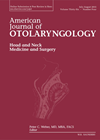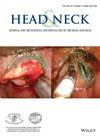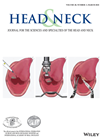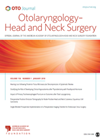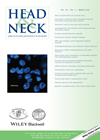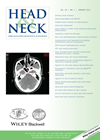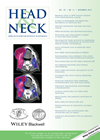
Journal Reviews
Does transoral robotic surgery improve outcomes among patients with head and neck cancer of unknown primary?
A tonsillectomy and tongue base mucosectomy is becoming increasingly accepted as the optimal surgical intervention to aid in identifying the primary source of a p16+ / HPV-related squamous cell carcinoma (SCC) of unknown origin, given that this disease almost exclusively...
Active smoking predicts poor outcome in HPV positive oropharyngeal squamous cell carcinoma
Tobacco smoking is a well-known risk factor in human papilloma virus (HPV)-negative head and neck squamous cell cancer. Its effects include increased risk of treatment failure, distant metastases and reduced overall survival. HPV has been increasingly implicated as a causative...
Impact of the updated cancer staging system on HPV-positive disease
The AJCC cancer staging manual was updated in 2017 (8th edition). It is used in the MDT setting for planning treatment and assessing prognosis for individual patients, and is also widely used internationally in clinical trials. Unlike previous iterations of...
An algorithm to distinguish between distant metastases and metachronous lung primary in patients with HPV-related oropharyngeal cancer
Distinguishing between distant metastases of HPV-related oropharyngeal squamous cell carcinoma (OPSCC) and metachronous primary lung squamous cell carcinoma (SCC) is important as it has implications for treatment, prognosis counselling, and registry data. Although p16 immunohistochemistry (p16 IHC) is widely accepted...
Difficult consultations with HPV-positive oropharnyeal cancer patients
The aetiological role of human papillomavirus (HPV) in oropharyngeal squamous cell carcinoma (OPSCC) is well established, and its incidence has massively increased over the last decade, whilst the incidence of HPV-negative OPSCC is declining. Although we know that HPV-positive OPSCC...
Risk factors for TORS treatment failure in HPV-related oropharyngeal cancers
HPV-related squamous cell cancers are an increasingly common cause of malignancy in the oropharynx. There is evidence that these cancers are associated with a significantly improved overall survival compared to conventional HPV-negative tumours. The optimal treatment for such cancers is...
The stigma of HPV in oral cancer
The increase of oropharyngeal carcinoma (OPC) in the developed world seems to be largely caused by infection with the human papillomavirus (HPV). HPV is a group of 150 DNA viruses that are common and most people will be infected at...

